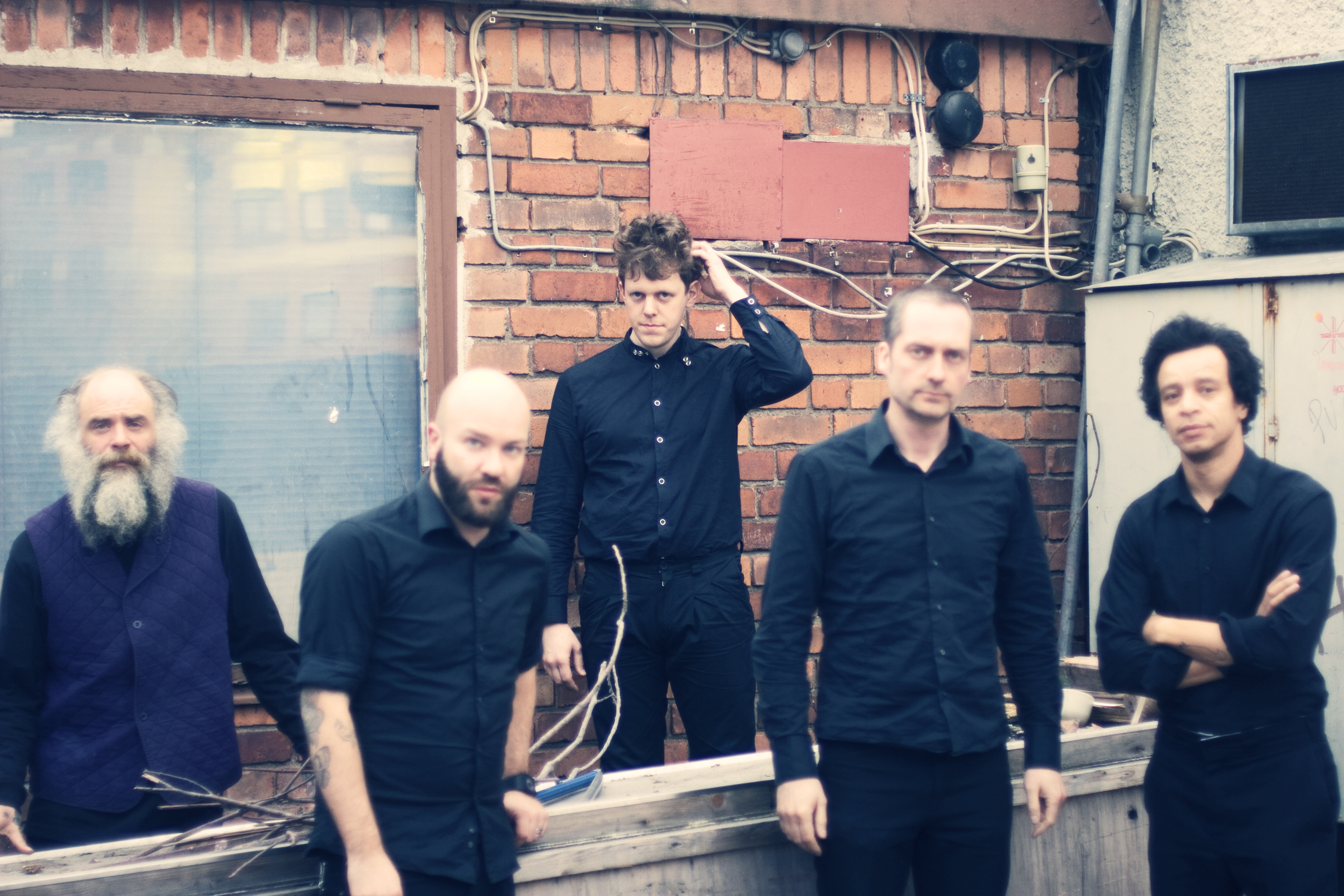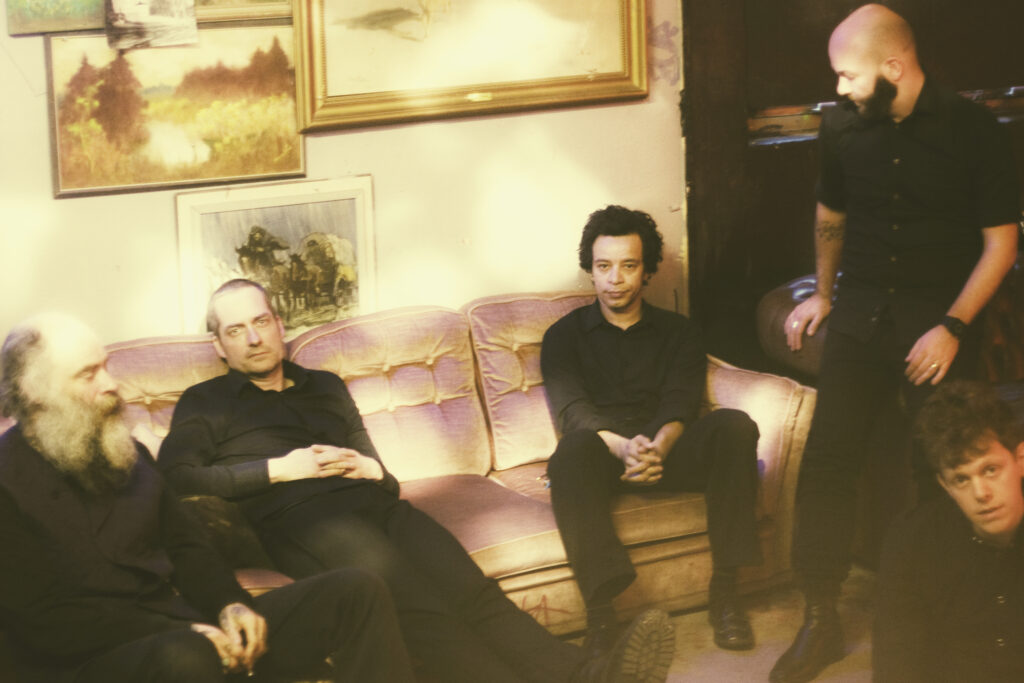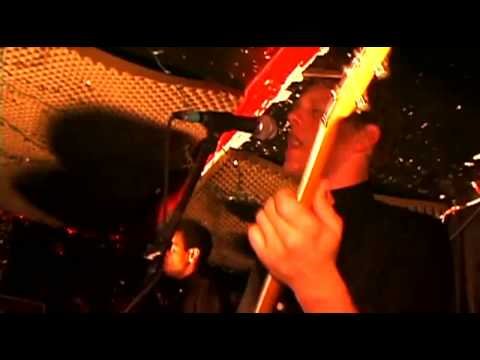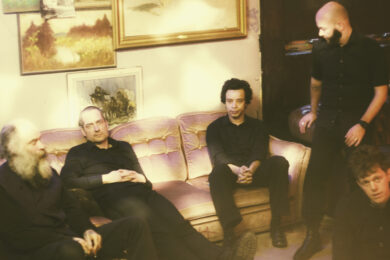The late, great Steven Wells had a particularly amusing amount of bile saved up for indie bands who were so lacking in imagination that they would name themselves after objects in their field of vision in the practice room. He said there was no worse band name than something like The Plugs or The Radiators or The Dirty Windows. One can’t help but think he would have given the completely un-rubbish,Swedish noise rock unit The Skull Defekts a pass.
The Stockholm-based band, who kicked off in 2005, mixing up primitavist, hypnotic rock that calls to mind Scratch Acid, Fugazi and Shellac with atavistic but punishing electronics, have always practiced where their drummer works his day job out of sheer necessity.
Daniel Fagerstroem (guitars/vocals/electronics) explains how their name was right under their very noses the whole time they were rehearsing: “It started with Henrik (Rylander, drums/electronics) who was working as a photographer. He has, for many years, been photographing the skull defects of people with really harsh dental issues such as cleft palates and split skulls. We rehearsed at his studio which was in the dentist’s building so we’d see a lot of these photographs literally hanging there as we were practicing. And we wanted to spell it with a ‘k’ so the name itself would have a defect.”
The four piece, also featuring Joachim Nordwall (guitar/vocals/synths) and Jean-Louis Huhta (percussion/electronics) have just released their best album to date, the electrifying Peer Amid. The visceral impact of this, their second album for Thrill Jockey, is certainly focused by the messianic presence of Lungfish frontman and internationally renowned tattoo artist, Daniel Higgs as guest musician and vocalist. It’s quite clear that both parties have a particular love for hypnotic, meditative ragas, riffs and drones.
We did notice that on first listen Peer Amid is a banging rock record but the more you listen to it, the more you can hear a lot of electronics on it.
Daniel Fagerstroem: Yeah. That’s how we play live and how we work in the studio as well. Some songs start out as just electronics and then build from there and some may start with a guitar riff or drum beat.
And by the time you’re recording stuff have the songs solidified or do they keep on evolving when you play them live?
DF: I wouldn’t say they keep on evolving but the structure of the song is always improvised live. Most of our songs only have one riff, so we just improvise around that and the songs can stretch out into eternity if the mood is right. We never play a song the same twice.
I read a recent review that said the album was very repetitive in a dull way which I think got it entirely wrong. Say if you take a track like ‘Fragrant Nimbus’ off the new album, of course it is pretty simple but it builds like acid house rather than a rock song.
DF: Yeah, of course…
Is repetition the key to the music?
DF: Yeah, of course. Repetition is everything. Perhaps ‘Fragrant Nimbus’ isn’t as dumb as some of the other tracks on the album. Wire magazine said we’d made a dumb rock record and that’s entirely right. It is meant to be primitive and repetitive and dumb.
The review is a bit misleading though, because it’s not repetitive in the same way that AC/DC are; and even if it was I would refuse to accept that it was even a bad thing, because AC/DC are obviously awesome. The progression and build of the song is marked and fairly difficult to miss I’d suggest.
DF: Of course.
I was trying to explain to someone on Twitter the other day and was having to boil it down to The Fall, Fugazi and Loop…
DF: I don’t know who Loop are.
Loop were a heavy, psychedelic rock band in England in the late 80s who had a Krautrock influence and were loosely affiliated with the shoegaze scene.
DF: I’ll have to check that out. With The Fall it is more a kind of mood thing that we share with them and the repetition. And Fugazi, definitely, we all listened to that band when they were around… I can’t really explain. Sometimes we say that we sound like an AC/DC loop but that doesn’t really explain it. It’s hard to pinpoint where the stuff comes from because we’re all record collectors and we listen to so much different stuff but we have found The Skull Defekts sound and it’s very simple and repetitive and the problem is that you can take those words and use them to describe other bands like AC/DC or Led Zeppelin or Shellac even. They are basic riffs with drums and vocals.
Is there a ritualistic intent behind the music, to songs like ‘Six Sixes’, which might be used to promote introspection or hypnotic dancing or anything like that?
DF: Of course, I wouldn’t say we were a ritualistic band but the songs can get you into a trance. That’s how it works for us when we record the songs at least. With Peer Amid we did one or two takes on each song and just hit it direct and recorded it. With playing the riffs on and on, you just get into the feeling and you can call it ritualistic or trance like but it definitely connects to something in our inner brains.
How did you first hook up with Daniel Higgs?
DH: I met him in 2005 in Spain at a festival where Lungfish played. Instantly we just started talking and connected through our first names. And then I lent him my shoes to use. I had these really, really bright red boots and after that we really connected and a couple of years later we met again. He met Joachim at ATP when Lungfish played. Me and Joachim met him in different places. Joachim did an album with Daniel on the Ideal label so we started talking about The Skull Defekts and other things. And then when we got to the US we sent him an email saying, ‘We’re playing a show in Baltimore’ where he lived at the time. He came to see our show and the day after he turned up in Washington at our show so we invited him onstage to sing with us, so we did like an improvised intro to the show with him on vocals. And we all just felt, ‘Yeah!’ So of course we knew that we were gonna ask if he wanted to do a record with us. We’re all really big fans of Lungfish and his solo stuff. It was really, really natural for all of us.
Did you record these songs together or did you get a groove worked out and get him to come along later? Did he improvise the words on the spot?
DF: He came here to the studio and I think we rehearsed for a couple of hours the day before putting the songs together. It’s always very fast for us we just write and record the song. The process is always very, very easy. We had a day in the studio rigging everything up and he had some lyrics that he’d brought. He had some ideas for songs. We just threw everything together. Everything was very fast. We just go for it… just let it happen.
He’s a very cosmic dude.
DF: Yeah… he’s a free spirit

There isn’t a highlight as such and I think it needs to be listened to as an album, which is weird for a collection of quite primitive rock songs but things seem to coalesce around ‘Gospel Of The Skulls’ a bit. What was it like when you performed that song live with an orchestra?
DF: We hadn’t played that song live. We recorded it once and did the vocals and then this group of people called Gothenberg String Theory got in touch. Their work revolves around three composers who invite groups to work with them and then they arrange orchestral parts to go with the work. They asked us if we wanted to do it and we said, ‘Yes of course’ but that meant we had to get Daniel Higgs in because we wanted to do that particular song. It was really powerful with two grand pianos and maybe fifteen string players, brass and orchestral percussion. It was really really powerful and very loud. It’s going to come out as a 7” with us on one side and CM von Hausswolff, another artist, on the other.
Can you tell us about how you came to work with Pan Sonic?
DF: Joachim has been recording with Mika Vainio which is going to be an album by those two, recorded in Einsturzende Neubauten’s studio in Berlin. It’s not really a Skull Defekts record, more of a side project.
One thing that Peer Amid reminded me of in terms of energy was The Ex, so I wasn’t that surprised to learn that you’d worked with Mats Gustafsson. How did that come about?
Daniel: He’s a really great saxophone player and he’s a really free dude and also his electronic stuff is really cool. He is a really cool guy.
And, Peer Amid may not give people the full range of what you do as a group so what can you tell us about The Skull Defekts?
DF: I’d say that Skull Defekts love one thing and that is repetition, which is kind of circular music so we do that with the rock albums and also with the drone albums so it’s really the same thing but described in different musical styles. So we’re really into the hard bass drones. So when we play live with only electronics it is more or less just humming!
Peer Amid is out now on Thrill Jockey




